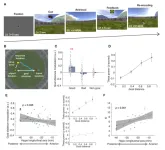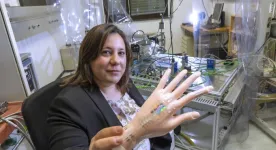(Press-News.org) Adolescents and young adults with advanced heart disease are at high risk of dying in the hospital, often require invasive treatment and experience significant symptoms that impact their quality of life.
And while most of their parents prefer that decision making about their treatment and care options remain between parents and physicians, many young people want to be actively involved in medical decisions affecting them, a new study suggests.
“As a pediatric psychologist, I have found that healthcare communication is one of the most critical – yet most underappreciated aspects of care,” said lead author Melissa Cousino, Ph.D., director of the U-M Congenital Heart Center Psychosocial and Educational Program (M-COPE) at University of Michigan Health C.S. Mott Children’s Hospital.
“How we communicate about diagnosis, prognosis, treatment options and more impacts coping, medical adherence, and health outcomes. In pediatric healthcare, it is critical that we better understand the communication and medical decision-making preferences of the young people we care for.”
Researchers surveyed 53 young adults ages 12-24 with advanced heart diseases, including heart failure – a lifelong condition in which the heart muscle can't pump enough blood to meet the body’s needs – along with 51 of their parents at Mott.
“In our sample of patients with serious heart disease, we found that the majority of teens and young adults want to be aware of their treatment options, risks and prognosis information and desire active involvement in their medical decision making,” Cousino said.
But there was a notable gap between the preferences of young patients and their parents, according to the research published in JAMA Network Open.
Nearly 45 % of patients desired active, patient-led decision making specific to their heart disease management with a considerable majority wanting to discuss adverse effects or risks of treatment, surgical details, quality of life and life expectancy.
Many youth surveyed agreed with the statement “I should make the decision but strongly consider the physician’s and my parents’ opinions.” More than half wanted to be involved in their end-of-life care decision making if critically ill.
Meanwhile, parents and guardians preferred an approach involving shared decision making between them and their child’s doctors.
“The largest proportion of parents felt they should make medical decisions for their teen or young adult in partnership with the medical team,” Cousino said. “Even though half of our patient sample were adults themselves, only six parents felt medical decision-making should be patient-led.”
“I often find that parents, as well as pediatric healthcare clinicians, are understandably trying to protect young people from the bad, sad, or difficult news,” she added. “Yet, for a large number of young people, keeping them from fully understanding or engaging in their healthcare, even when information is related to death or dying, can be more isolating and anxiety-provoking.”
Cousino says research on patient communication and medical decision making was recently identified as a top priority in the field of palliative care in pediatric cardiology.
“There is not a one-size-fits all approach to medical communication and decision making. Each child, teen, young adult and family system has different needs and preferences,” she said.
“It is on us to better understand youth needs and preferences to best incorporate their voice into medical care decisions in a way that is aligned with their needs. Ultimately, this will inform the development of interventions to support parents and healthcare clinicians working with young people facing serious illnesses and arduous medical courses.”
Senior author, Kurt Schumacher, M.D., a pediatric cardiologist at Mott, says the study has important implications for clinicians caring for children and young adults with serious heart disease.
“The study should get the attention of all clinicians who care for children with significant heart disease. We all communicate with families, but not everyone is aware of the information that our patients would like to receive and discuss,” he said. “Both parents and providers may be underestimating how actively involved adolescents and young adults want to be when it comes to decisions about their heart disease.”
“These findings underscore the importance of understanding each individual’s preferences and personalizing communication methods with each young patient regardless of their diagnosis, disease severity or symptoms,” Schumacher added.
“We need to continue to pursue individualized conversation tools and decision-making interventions with young patients with advanced heart disease. And we need to help providers be comfortable and open with these discussions as well.”
END
Adolescents, young adults with advanced heart disease show desire to take active role in medical care decisions
One center finds discord between medical decision-making preferences of youth with heart failure and their parents
2023-05-05
ELSE PRESS RELEASES FROM THIS DATE:
UCLA researchers find possible link between self-perceived cognition deficits and symptomatic long COVID
2023-05-05
People who perceived that they had cognitive difficulties such as memory problems during COVID were more likely to have lingering physical manifestations of the disease than people who did not report cognitive issues, new UCLA research suggests.
More than one in three people experiencing long COVID symptoms perceived such cognitive deficits, which have been found to be related to anxiety and depression.
The findings indicate that psychological issues such as anxiety or depressive disorders may ...
Human hippocampus theta oscillations code goal distance during spatial navigation
2023-05-05
A research team led by Dr. WANG Liang from the Institute of Psychology of the Chinese Academy of Sciences has found that right hippocampal theta power hierarchically encodes the distance between the current position and a goal destination.
The study was published online on May 5 in Current Biology.
Successful navigation to a goal is crucial for animals in nature as well as for humans in modern life. Computational models show that goal-directed navigation computes the Euclidean distance to the goal. Multi-scale representation of goal distance is extremely efficient and less susceptible to interference from background noise than single-scale coding. ...
Calls for more positive health messaging around fertility
2023-05-05
The language used to communicate fertility awareness should be more empathetic and target both men and women, finds a new study involving UCL researchers.
The review, published in Human Reproduction Open, gives five recommendations on how to promote fertility awareness in a more positive way.
While education about fertility is not intrinsically controversial, finding the right language to address the topic can be difficult – with the risk of causing negative effects such as anxiety, culpability, and stigma.
After reviewing previous studies and literature on the subject, the team were particularly keen to resolve issues around language that could evoke feelings of personal blame, ...
ICTA-UAB demands the European Parliament to take action to fight pollution in the Mediterranean Sea
2023-05-05
The implementation of effective policies at local and regional level, and the cooperation of all countries in the Mediterranean Sea basin is urgently needed to successfully reverse the environmental problems in this marine area. This is evidenced by a report carried out by the Institute of Environmental Science and Technology of the Universitat Autònoma de Barcelona (ICTA-UAB) presented in the European Parliament by oceanographer Patrizia Ziveri, who stresses the need to urgently fight against the growing pollution caused by marine litter and plastics in the Mediterranean, to improve current legislation and to monitor new pollutants that ...
Two ERC proof of concept grants for the University of Bonn
2023-05-05
Two researchers from the University of Bonn have been awarded a Proof of Concept Grant by the European Research Council (ERC) as part of a program designed to help researchers translate their ideas from previous ERC projects into commercial applications. Biologist Prof. Dr. Bernardo S. Franklin from the University Hospital Bonn and physicist Prof. Dr. Simon Stellmer will thus each receive €150,000 over a period of around one year.
Prof. Dr. Bernardo S. Franklin from the Institute for Innate Immunity and the ImmunoSensation2 Cluster of Excellence studies hematopoietic stem cells (HSCs), which develop into different blood cells through ...
Smart artificial skin in application check stage: Graz University of Technology researcher wins ERC Proof of Concept grant
2023-05-05
Just a few months ago, Anna Maria Coclite and her team from the Institute of Solid State Physics at Graz University of Technology (TU Graz) presented the results of their research as part of Coclite’s ERC Starting Grant project “SmartCore”. They had succeeded in developing the three-in-one “smart skin” hybrid material, which closely resembles human skin by simultaneously sensing pressure, moisture and temperature and converting them into electronic signals. With 2,000 individual ...
Uncovering the mysteries of alfalfa seed dormancy through multispectral imaging analysis
2023-05-05
Alfalfa (Medicago sativa), commonly called the “King of Grass,” is a legume grown in many parts of the world as a source of animal fodder. It is prized in the forage industry for its high protein content and biomass yield. Recently, alfalfa protein has found applications in aquaculture, pet food industry and human diet. Furthermore, it is seen as an environmentally beneficial crop, with positive impacts on biodiversity and soil nitrogen conservation.
Alfalfa produces two seed types—hard and non-hard—with no obvious visible differences. Unfortunately, the hard seeds ...
New concept for lithium-air batteries
2023-05-05
Lithium-air batteries, also known as lithium-oxygen batteries, are candidates for the next generation of high-energy electricity storage devices. Their theoretical energy storage capacity is ten times that of conventional lithium-ion batteries of the same weight, but they are not yet chemically stable enough to provide a reliable solution. Now a newly launched collaborative research project in which a team from the University of Oldenburg, Germany, led by chemist Professor Dr. Gunther Wittstock is participating is testing ...
Study hints at potential for health conditions to be diagnosed earlier
2023-05-05
Conditions such as coeliac disease and Parkinson’s disease could be detected in principle up to 10 years earlier than they are currently, suggests a new study by UCL researchers.
The study, published in the British Journal of General Practice, reviewed existing evidence on how people’s use of healthcare changed in the weeks, months and years ahead of the diagnosis of a range of conditions. This detectable change in healthcare use indicates the condition’s “diagnostic window” – that is, the point at which diagnosis in some patients may theoretically be possible.
While ...
Playing shadow puppets with NASA's Hubble Space Telescope
2023-05-05
Scientists' Hubble Space Telescope observations of the young star, TW Hydrae may signal new planets under construction.
In 2017 astronomers reported discovering a shadow sweeping across the face of a vast pancake-shaped gas-and-dust disk surrounding the red dwarf star. The shadow isn't from a planet, but from an inner disk slightly inclined relative to the much larger outer disk – causing it to cast a shadow. One explanation is that an unseen planet's gravity is pulling dust ...
LAST 30 PRESS RELEASES:
Ultrasound AI receives FDA De Novo clearance for delivery date AI technology
Amino acid residue-driven nanoparticle targeting of protein cavities beyond size complementarity
New AI algorithm enables scientific monitoring of "blue tears"
Insufficient sleep among US adolescents across behavioral risk groups
Long COVID and recovery among US adults
Trends in poverty and birth outcomes in the US
Heterogeneity of treatment effects of GLP-1 RAs for weight loss in adults
Within-person association between daily screen use and sleep in youth
Low-dose lithium for mild cognitive impairment
Catheter ablation and oral anticoagulation for secondary stroke prevention in atrial fibrillation
A new theory of brain development
Pilot clinical trial suggests low dose lithium may slow verbal memory decline
Bioprinting muscle that knows how to align its cells just as in the human body
A hair-thin fiber can read the chemistry of a single drop of body fluid
SwRI develops magnetostrictive probe for safer, more cost-effective storage tank inspections
National report supports measurement innovation to aid commercial fusion energy and enable new plasma technologies
Mount Sinai, Uniformed Services University join forces to predict and prevent diseases before they start
Science of fitting in: Do best friends or popular peers shape teen behavior?
USF study: Gag grouper are overfished in the Gulf; this new tool could help
New study from Jeonbuk National University finds current climate pledges may miss Paris targets
Theoretical principles of band structure manipulation in strongly correlated insulators with spin and charge perturbations
A CNIC study shows that the heart can be protected during chemotherapy without reducing antitumor efficacy
Mayo Clinic study finds single dose of non-prescribed Adderall raises blood pressure and heart rate in healthy young adults
Engineered immune cells show promise against brain metastases in preclinical study
Improved EV battery technology will outmatch degradation from climate change
AI cancer tools risk “shortcut learning” rather than detecting true biology
Painless skin patch offers new way to monitor immune health
Children with poor oral health more often develop cardiovascular disease as adults
GLP-1 drugs associated with reduced need for emergency care for migraine
New knowledge on heritability paves the way for better treatment of people with chronic inflammatory bowel disease
[Press-News.org] Adolescents, young adults with advanced heart disease show desire to take active role in medical care decisionsOne center finds discord between medical decision-making preferences of youth with heart failure and their parents





